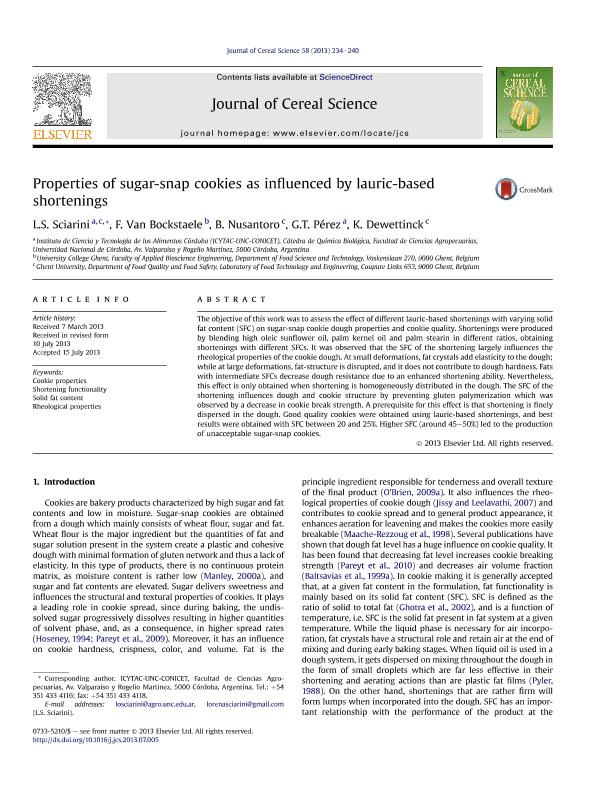Mostrar el registro sencillo del ítem
dc.contributor.author
Sciarini, Lorena Susana

dc.contributor.author
Bockstaele, F. van
dc.contributor.author
Nusantoro, B.
dc.contributor.author
Perez, Gabriela Teresa

dc.contributor.author
Dewettinck, K.
dc.date.available
2017-09-22T21:37:33Z
dc.date.issued
2013-08
dc.identifier.citation
Sciarini, Lorena Susana; Bockstaele, F. van; Nusantoro, B.; Perez, Gabriela Teresa; Dewettinck, K.; Properties of sugar-snap cookies as influenced by lauric-based shortenings; Elsevier; Journal of Cereal Science; 58; 2; 8-2013; 234-240
dc.identifier.issn
0733-5210
dc.identifier.uri
http://hdl.handle.net/11336/25015
dc.description.abstract
The objective of this work was to assess the effect of different lauric-based shortenings with varying solid fat content (SFC) on sugar-snap cookie dough properties and cookie quality. Shortenings were produced by blending high oleic sunflower oil, palm kernel oil and palm stearin in different ratios, obtaining shortenings with different SFCs. It was observed that the SFC of the shortening largely influences the rheological properties of the cookie dough. At small deformations, fat crystals add elasticity to the dough; while at large deformations, fat-structure is disrupted, and it does not contribute to dough hardness. Fats with intermediate SFCs decrease dough resistance due to an enhanced shortening ability. Nevertheless, this effect is only obtained when shortening is homogeneously distributed in the dough. The SFC of the shortening influences dough and cookie structure by preventing gluten polymerization which was observed by a decrease in cookie break strength. A prerequisite for this effect is that shortening is finely dispersed in the dough. Good quality cookies were obtained using lauric-based shortenings, and best results were obtained with SFC between 20 and 25%. Higher SFC (around 45–50%) led to the production of unacceptable sugar-snap cookies.
dc.format
application/pdf
dc.language.iso
eng
dc.publisher
Elsevier

dc.rights
info:eu-repo/semantics/openAccess
dc.rights.uri
https://creativecommons.org/licenses/by-nc-nd/2.5/ar/
dc.subject
Cookie Properties
dc.subject
Shortening Functionality
dc.subject
Solid Fat Content
dc.subject
Rheological Properties
dc.title
Properties of sugar-snap cookies as influenced by lauric-based shortenings
dc.type
info:eu-repo/semantics/article
dc.type
info:ar-repo/semantics/artículo
dc.type
info:eu-repo/semantics/publishedVersion
dc.date.updated
2017-09-21T19:05:20Z
dc.journal.volume
58
dc.journal.number
2
dc.journal.pagination
234-240
dc.journal.pais
Países Bajos

dc.journal.ciudad
Amsterdam
dc.description.fil
Fil: Sciarini, Lorena Susana. Consejo Nacional de Investigaciones Científicas y Técnicas. Centro Científico Tecnológico Conicet - Córdoba. Instituto de Ciencia y Tecnología de Alimentos Córdoba. Universidad Nacional de Córdoba. Facultad de Ciencias Químicas. Instituto de Ciencia y Tecnología de Alimentos Córdoba; Argentina
dc.description.fil
Fil: Bockstaele, F. van. University College Ghent; Bélgica
dc.description.fil
Fil: Nusantoro, B.. University of Ghent; Bélgica
dc.description.fil
Fil: Perez, Gabriela Teresa. Consejo Nacional de Investigaciones Científicas y Técnicas. Centro Científico Tecnológico Conicet - Córdoba. Instituto de Ciencia y Tecnología de Alimentos Córdoba. Universidad Nacional de Córdoba. Facultad de Ciencias Químicas. Instituto de Ciencia y Tecnología de Alimentos Córdoba; Argentina
dc.description.fil
Fil: Dewettinck, K.. University of Ghent; Bélgica
dc.journal.title
Journal of Cereal Science

dc.relation.alternativeid
info:eu-repo/semantics/altIdentifier/doi/http://dx.doi.org/10.1016/j.jcs.2013.07.005
dc.relation.alternativeid
info:eu-repo/semantics/altIdentifier/url/http://www.sciencedirect.com/science/article/pii/S0733521013001215
Archivos asociados
